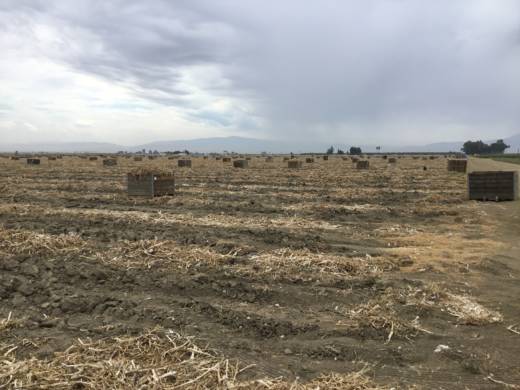But AB 1419 failed to get the 41 votes needed for passage on the Assembly floor: 35 members voted for the legislation and 26 voted against it. Sixteen members -- all Democrats, including several representing rural districts -- declined to vote on the measure.
Ag Money in the Assembly
Assembly members who voted no on the bill received, on average, about $4,000 more from four farm and chemical industry groups that took positions opposing the legislation than those who backed the measure. That's according to an analysis of campaign finance data from the California Secretary of State's Office by MapLight, an organization that studies the influence of money in politics.
Between January 2015 and December 2017, the California Farm Bureau Federation, Western Growers Association, Agricultural Council of California and the Western Plant Health Association gave on average $6,298 to members of the Assembly who voted against the pesticide bill, MapLight found.
The 35 members who voted for the measure received an average of $2,313 from the four groups, MapLight's analysis says. That included 13 members who got an average of $6,034 from the groups and 22 members who got no contributions at all from them.
Members of the Assembly who declined to vote either way on the bill received an average of $6,090.
"It's rarely so stark that you can see dollars spent roughly correlating into votes," said Jessica Levinson, a professor at Loyola Law School who specializes in campaign finance.
"We have very clear dollar amounts that we can roughly link to votes," said Levinson, who is also president of the Los Angeles Ethics Commission. "Money makes a big difference, and the agricultural industry spent money in a very effective way."
One of two Democrats who voted no on the bill, Elk Grove Assemblyman Jim Cooper, received $22,100 in donations from agricultural industry groups that took a position on the bill, more than any other member of the Assembly.
An aide to Cooper did not respond to a request for comment.
Assemblywoman Catharine Baker, R-San Ramon, who also voted no, was No. 2 in donations from those who opposed the bill, with $21,700.
"Campaign contributions have no influence ... on how I vote," Baker said Friday in an emailed statement through a spokeswoman. She added that "arbitrarily" raising potential fines from $5,000 to $25,000 "is not the answer."
Levinson says legislators bristle at the issue of campaign donations and their potential ties to how they may vote.
"Lawmakers don't like it when the curtain is peeled back, and we look at hard data and we look at money being spent and we look at votes and we draw our own conclusions," Levinson said.
Critics: Too Much Ag Industry Influence in Sacramento
Farmworker advocates say the data show how difficult it is to get reforms in agricultural practices through the Legislature.
"Pesticide corporations and their allies wield significant influence in the state Capitol," said Paul Towers, organizing director of Pesticide Action Network North America.
He says the campaign donations show that the industry exerts too much power over legislators, particularly in rural and agricultural regions of the state.
"We need to peel back that influence," Towers said. "The current farming system doesn't serve the most vulnerable communities and needs to be fixed."
"Californians do care about what's in their food, how it's grown and who it affects," Towers said. "What ends up on our food down the chain, we all have a stake in that. Our legislators need to vote with that in mind."
Industry Opposition
The California Farm Bureau Federation opposed the bill, its representatives have said, because the state's current policies already give county agricultural commissioners and the California Department of Pesticide Regulation enough authority to enforce pesticide safety rules.
"It's not terribly surprising that we or other agricultural organizations might contribute to candidates that share our priorities and philosophy, or that those candidates, once elected, might continue to follow those priorities or that philosophy," federation spokesman Dave Kranz said in an email.
"Environmental and labor organizations make substantial contributions to candidates, and it's safe to say that a number of environmental and labor bills have passed the Legislature with the support of elected officials backed by those interests," Kranz said.
Representatives for the three other industry associations that opposed higher fines for pesticide violations did not respond to requests for comment.
Groups that officially registered support for the failed pesticide bill gave a total of $700, to two members of the Assembly, in the two years before it was rejected, according to MapLight. Neither member cast votes on the bill.
The Environmental Working Group, Pesticide Action Network, Breast Cancer Prevention Partners and California Rural Legal Assistance were officially on record supporting the legislation. Only California Rural Legal Assistance made campaign donations.
Bill's Author: 'We Just Ran Out of Time'
Quirk said he does not think the agricultural industry has too much influence over the Legislature.
"It's my belief that members make decisions based upon what they think is right, and that's what I think the members did," Quirk said in an interview.
Quirk says he was caught off guard by the timing of the vote. It came as the deadline for voting on the bill approached, and Quirk says he thought he had one more day to rally support.
"I did not have a speech prepared. I hadn't finished negotiations with the opponents," Quirk said. "Everything was at the last minute and there was just no time."
Quirk said he's working with state pesticide regulators and could introduce a similar bill next year.
A spokeswoman for the Department of Pesticide Regulation says the agency has not yet decided when it will push for the legislation.

